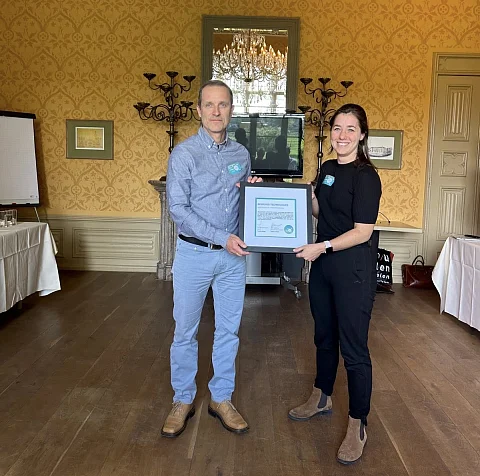This Startup Can Actually Recycle Plastic from Electronics and Cars
24-05-2024
Currently, only a small portion of plastic from electronics, computers, cars, snack bags, or showerheads is recycled into clean, new raw materials. Start-up Resolved Technologies has found a solution to this problem—literally: dissolving plastic in a solvent. Next year, a pilot plant at the Chemelot chemical complex will start recycling 25 kilos of plastic per hour using this method.
After successful lab testing, the technology is being scaled up in phases. First, a pilot plant set for completion in 2025, and by 2027, an expanded demo plant will process 4,000 tons of plastic per year. Eventually, a full-scale plant is planned to recycle 10,000 to 12,000 tons annually. “We develop the technology, bring it to market, and aim to produce recycled material, either independently or with partners,” explains Norbert Fraunholcz, founder and CEO of Resolved Technologies.
Most plastic is mechanically recycled
To achieve full circularity by 2050, the Netherlands aims for plastic manufacturers to use 25-30% recycled plastic by 2030. “Significant scaling is needed to reach this goal,” notes Fraunholcz.
Most plastic recycling methods today are either mechanical or chemical. Mechanical recycling involves washing, grinding, and melting plastic waste, resulting in plastic pellets while keeping the polymers intact. Chemical recycling, on the other hand, breaks down plastic into its original building blocks (monomers) through reactions like heating, as in pyrolysis. Once purified, new plastic can be made from these monomers. Mechanical recycling’s pellets can go directly into new products.
Only 3% recycled content
There are, however, challenges. With current plastic collection and recycling technologies, the 2030 target is unlikely to be met. Chemical recycling is still in its early stages, costly, and energy-intensive. Additionally, recycled material often can’t compete with cheap new plastic from China and the U.S. Moreover, plastic recyclate from mechanical recycling is often not clean enough for high-quality use in electronics or cars due to contaminants, adhesives, paints, metal coatings, and other additives that mechanical recycling can’t fully remove. Only 17% of the world’s growing electronic waste (e-waste) is collected and recycled, and the figures for plastic are even lower. Although the EU has the most advanced e-waste and car scrap collection and recycling systems globally, most plastics from this waste are incinerated, landfilled, or downcycled. New electronics and cars contain only 3% recycled plastic.
100% purification
To increase this percentage, Fraunholcz advocates for a third technique: fully dissolving plastic in an organic liquid, then purifying the solution of contaminants. This technique complements, rather than replaces, the two existing methods. “We’re in between the current two techniques,” he says. “Our process keeps polymers intact, but after dissolving, we purify them at a molecular level. This achieves a much higher purity in recycled plastic than mechanical recycling and allows new separation options. For example, paint or metallic coatings on snack bags, faucets, showerheads, and painted car or electronics parts are difficult to remove with mechanical recycling. We can remove these contaminants completely, producing a high-quality pellet usable in cars, electronics, and other applications.”
Limitations of existing techniques
A raw material technologist by training, Fraunholcz has worked in plastic recycling since graduation. “It’s in my DNA,” he says. Around 2018, market analysis showed him that recycling would become increasingly crucial due to circular economy targets for 2050. He also recognized mechanical recycling’s limitations in achieving high-purity recyclate. “Mechanical recycling is vital, but it alone won’t achieve full circularity,” he explains. “Chemical recycling also has limitations due to cost, high energy consumption, and lower yields. Only part of the broken-down plastic can be reused as raw material.”
A mix of techniques
In the coming years, he envisions a mix of all three recycling methods. “All three will be needed, but we believe dissolution will play a key role,” Fraunholcz says. He founded Resolved Technologies in late 2020, based at the Brightlands Campus at the Chemelot complex in Limburg. The start-up adopted and further developed an existing dissolution technology. Many companies, institutes, and countries are now exploring this method. “Back in 2018, it was only a handful, but now there are quite a few,” Fraunholcz adds.
The pilot plant under construction received a JTF subsidy. The demo plant will require an additional €10 to €15 million, for which the company will seek investors later this year.
Closed-loop recycling
A key aspect of Resolved Technologies’ method is enabling closed-loop recycling, meaning the plastic from cars and electronics can be reused in the same products after recycling. Currently, most plastic waste is downcycled for other, lower-grade applications, known as open-loop recycling.
Green Chemistry Accelerator

This year, Resolved Technologies participated in the Green Chemistry Accelerator (GCA) program of Green Chemistry, New Economy (GCNE). The platform aims for a circular chemical industry with innovative technologies, free from fossil fuels and CO2 emissions by 2050. The start-up contributes to green chemistry by enhancing plastic circularity and reducing CO2 emissions through a less energy-intensive dissolution process compared to petroleum-based plastic production. “It’s a double win,” says Fraunholcz.
Invaluable support
The GCA program, established with Invest-NL and Regional Development Companies (ROMs), helps start-ups scale up to become full-fledged businesses. The program enables them to build pilot plants, enter the market, and eventually produce thousands of tons of recycled or bio-based plastic materials. Through masterclasses and discussions with experts, Resolved Technologies confirmed its approach and business model were on the right track. Fraunholcz also expanded his knowledge and network. “It was invaluable to learn what challenges other start-ups face and how they tackle them. That’s inspiring,” he reflects.
This article also appeared on Change Inc., by editor André Oerlemans, as part of a series on Green Chemistry, New Economy.

